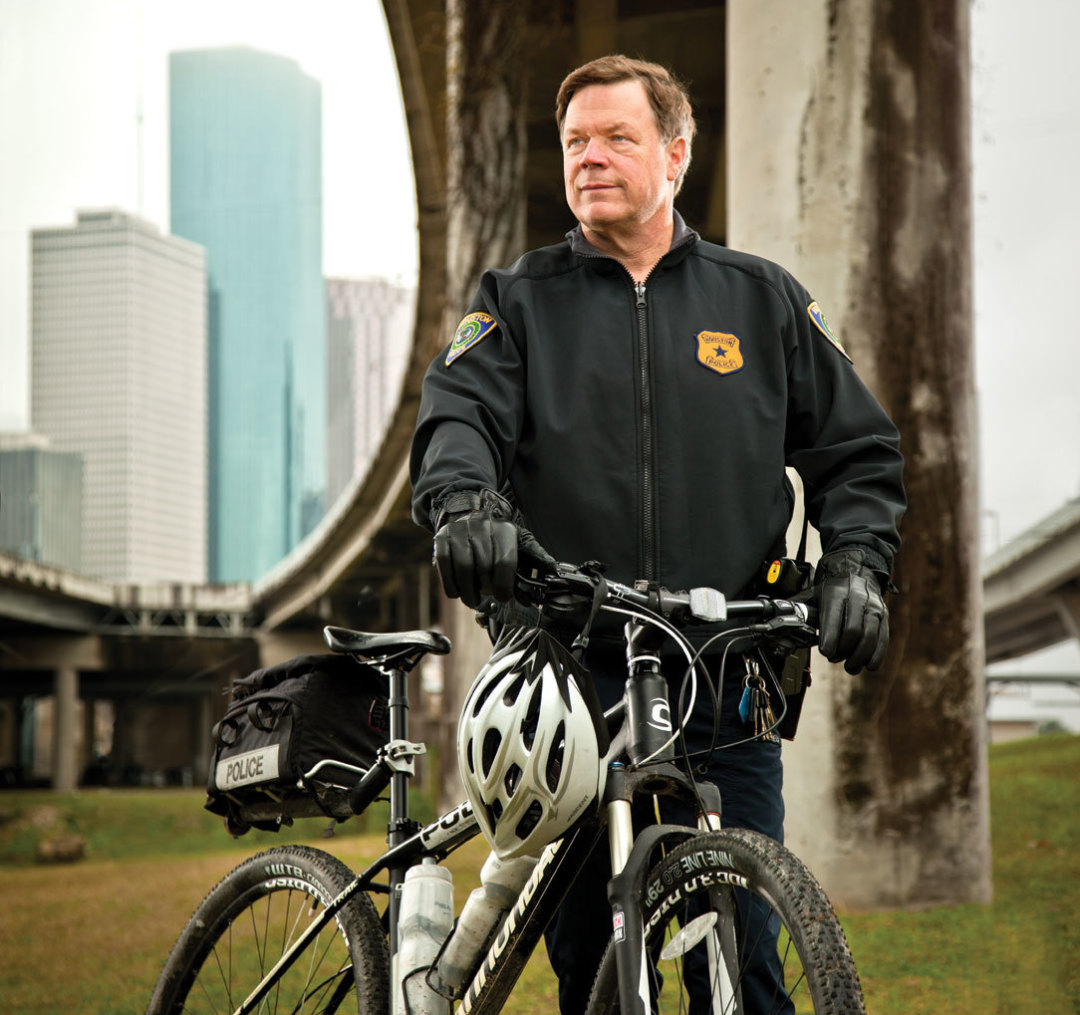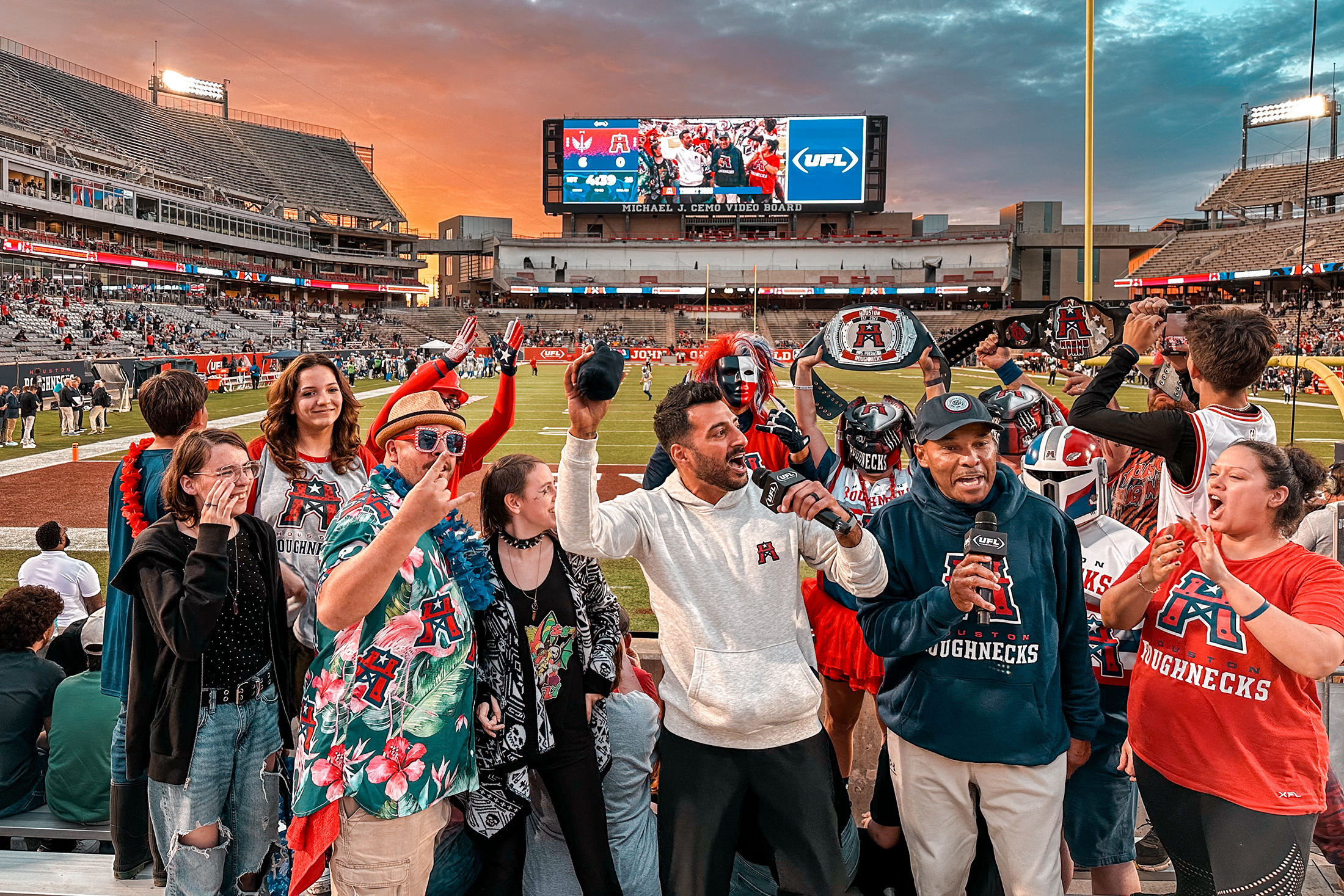Meet the Man Behind HPD’s Successful Homeless Outreach Team

Steve Wick founded the HPD’s Homeless Outreach Team in 2001.
Image: Charles Ford
For more than 22 years, Sgt. Steve Wick has patrolled the streets of downtown Houston on a bicycle, a mode of transport that, among other things, has brought him into close contact with the estimated 500-plus homeless people who take shelter under the Pierce Elevated, in Tranquility Park, on the banks of Buffalo Bayou, and elsewhere in the city’s core. Needless to say, the HPD veteran’s two-wheel tour has taught him a few things. First and foremost:
“Everyone is out there for a reason,” says the 58-year-old. “They are all broken in some way. We just need to find out what the reason is and help them get off the street.”
Hearing those words, you’d never think that the problem of homelessness was one of the country’s most vexingly complex, but it is, and Wick knows this. There is an almost illimitable number of reasons why Houstonians take to the streets, from substance abuse, to mental illness, to domestic violence, to unemployment. And there are just as many reasons, if not more, why the homeless don’t seek refuge in the city’s shelters. Sometimes they feel unsafe, sometimes a criminal background disqualifies them, sometimes shelters prohibit pets, and on and on.
And finally, there are all the factors to consider when positing a solution to homelessness. What’s truly best for the individual? What about civil rights? What’s best for public safety?
Wick knew the challenges. He knew too how ineffective traditional policing is, which is to say cops routinely rounding up people living on the streets, only to see them right back out there shortly thereafter. For years, he tried to reach out through local service organizations, but that experience only highlighted how complex the problem really was. “There wasn’t a whole lot of follow-up,” he explains. “Those folks would be off the street, but it would be very short-term.”
Then, a few years ago, Wick attended a Dallas-area conference on problem-oriented policing, which led to a week in Colorado Springs, where he learned about some of the groundbreaking strategies employed by that city’s police force to deal with homelessness.
The result? The HPD’s Homeless Outreach Team, which Wick founded in 2011, a unit that grew to consist of four officers, three case managers from the Harris County Mental Health and Mental Retardation Authority, and, of course, the sergeant. The point of the effort, then as now, is to have a response team that can react in a nuanced way when HOT officers encounter the homeless, a team that builds trust through ongoing personal contact.
“At first, nobody really wanted to do it,” says Wick of his fellow HPD officers. “We were told they didn’t want to go out and hug the homeless.” And aid organizations and homeless advocates were even more resistant to HOT.
“Initially, it was not received well. The providers thought we were all out to round up the homeless.”
Both came around, however, when they saw the success that Wick and his team were having on the streets. As of now, four years into its existence, HOT has transitioned more than 400 homeless Houstonians. Indeed, the city as a whole has almost 40 percent fewer homeless people than it did just four years ago, according to a report by the Coalition for the Homeless, and while HOT can’t take credit for more than a fraction of that reduction, its successes downtown cannot be overlooked.
“The district attorney’s office and detectives, if they’ve got a hard case that involves the homeless, they call us and ask us to help,” Wick explains. “Because we’ve got a good relationship with people on the street, we’ve cleared some great cases.” Many of those involve crimes against the homeless themselves.
That’s helped get fellow officers, who receive training in a class Wick and his team teach at the Police Academy, on board. Whereas once the officers made fun of HOT, “now they call us to have us help them.”
A lot of what Wick’s team does is facilitate connections, everything from helping insurance companies track down policy beneficiaries, to helping families find loved ones, to helping the homeless navigate local bureaucracy. “One of the huge problems with people living on the street is if they lose their ID,” Wick says by way of example. “You can’t access any services without identification. The way DPS and Social Security are set up, you can’t get an ID without having picture ID. It’s a catch-22.” And so the HOT team worked with DPS and the Bureau of Vital Statistics to establish ID-verification letters as an accepted form of identification.
“They are just people who have a story and a reason they are out there,” says Wick of the men and women who live on Houston’s streets. “You need to talk to them, build a relationship with them, and then do your best to access the available services.”
As for his work, he simply says, “I love it. All my officers love it. Everybody is passionate about what we do.” That includes some of the homeless themselves, believe it or not. As one man put it in a video produced by NationSwell, a website that spotlights innovative solutions to society’s problems, “I have two friends in the world—Mr. Wick and my cat.”




